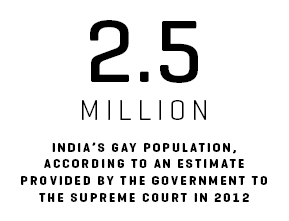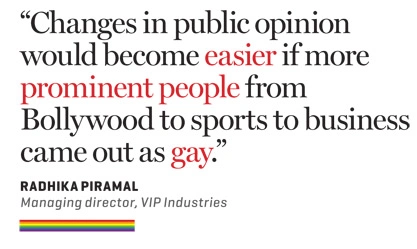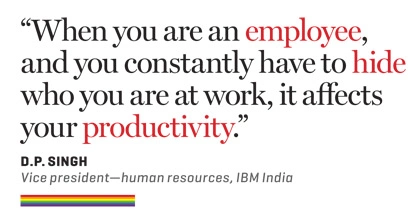After three rounds of whiskeys at the Press Club in Delhi, the conversation has graduated from work gossip to matters of graver import. We pass around a plate of tandoori chicken as cheap food and drinks stir up frenzied chatter in the packed open-air restaurant. Amid the cacophony, our group of business journalists is holding forth on caste (turn to page 92 for our story) and arranged marriage.
Lighting up a Gold Flake Kings, an ex-colleague in his mid-forties declares that his son is free to marry anyone he wants whenever he is ready. The boy, who is studying for his Class XII board exams, wants to be an architect (which in the hierarchy of professions is a few rungs below engineer, his father's preference). Engineer or not, he won't hold his son hostage to the parochial family tradition of marrying within his own Kurmi caste. So far so good, everyone at the table salutes his progressive worldview with a clink of glasses. Then, out of the blue, the narrative takes an unexpected twist.
"There is just one thing I won't tolerate," he says, puckering out a ball of smoke. "I won't allow him to be gay." His expression betrays disgust, as if the image of his son bringing home a grizzly boyfriend has triggered a gag reflex. "This thing ... gays ... it is unnatural," he spits. Homosexuality, he tells us, is a revolting perversion that can be "cured" or at the very least “avoided by heterosexual marriage".
When those colleagues with whom we drink and socialise harbour such vehement prejudice against homosexuality, it is easy to understand why so few members of the lesbian, gay, bisexual, transgender (LGBT) community are willing to come out—perhaps the first and most crucial step towards wider acceptance and inclusion.
Corporates, it is often suggested, will spearhead the gay rights movement and combat such prejudice. In an article entitled 'India Inc. Likely to Emerge as Biggest and Most Effective Flagbearer of LGBT Rights in 2016', business daily The Economic Times highlights the inclusive policies of leading organisations such as Godrej, Genpact, Intuit, ThoughtWorks, Microsoft, Goldman Sachs, and Google as evidence that organisations are taking LGBT issues seriously.

After speaking to several members of the LGBT community and approaching more than 16 companies, Fortune India finds the subject is still treated as taboo, despite, in some cases, anti-discrimination rules. Companies don't want to discuss it, while hardly anyone from the community is ready to disclose their identities out of fear of reprisal.
Though policies may appear LGBT friendly on paper—often even those aren't in place—attitudes at the workplace range from apathy to disdain. That toxic atmosphere prevents people from coming out—the cathartic, and to many people, defining process of disclosing one’s sexual orientation or gender identity to people around them. And this not only alienates the LGBT community, it is also bad for business.
LGBT think-tank and advocacy group Mingle's 2016 Workplace Climate Report offers up some "sobering statistics". Only a quarter of the 100 people it surveyed "came out" to colleagues, whereas 44% were out to families. "Clearly, in spite of nearly half of our respondents being covered by LGBT protection policies in the workplace, most are not comfortable coming out yet—an indication that policies and workplace culture may not necessarily be aligned," the report notes.
Although keeping one's sexuality secret may save employees from potential abuse and keep their lives private, it also prevents them from reaching out to others with similar struggles or from gaining access to resources that the company may offer. Medical help, particularly insurance, is a thorny subject for LGBT employees in a heteronormative world. For starters, there is a high incidence of depression and anxiety disorders, as the spectre of discrimination, prejudice and abuse looms over the community.
LGBT people aged 13 to 18 are “twice as likely to attempt suicide as their heterosexual peers”, according to the Centres for Disease Control and Prevention in the U.S. In India, there is a paucity of data on LGBT mental health issues; authorities don't even have a handle on the size of the community. In 2012, the Indian government told the Supreme Court, in a controversial case we'll discuss later, it believed the country had 2.5 million gay people of which 7% were HIV-positive.
Leave aside same-sex partnership benefits (only 4% of the employees surveyed by Mingle were covered by those), several companies don't even have the most basic protection policies in place. "Even multinationals based outside India which have non-discriminatory policies and practices in their Western offices, often do not replicate them for their Indian employees," the Mingle report says.
Take HSBC India, known globally for its support for LGBT rights, for instance. Rahul Vohra (name changed) is a gay middle management executive for HSBC India, where he has worked in various roles for several years. “HSBC has diversity peer groups for LGBT employees all over the world. But we don’t have one here. I wrote to a generic e-mail ID asking if I can be part of another global office’s diversity group, or if I can take the lead and make one here. I never got an answer.”
Vohra has come out to family and friends, but keeps his sexuality under wraps at the workplace. “It’s not easy to come out. You always fear, what if I have a loss of reputation? What if people pick on me? [Coming out] professionally is a bigger challenge than in our personal lives. I haven’t had the courage to do it." HSBC India declined to participate in the story.
That fear of professional discrimination and ridicule explains why Mingle's survey shows that more people come out to their family than to colleagues, despite higher levels of acceptability at the workplace. According to the survey, 31% of those who have come out to family members say they disapprove, while only 15% disapprove in the workplace.
Even well-intentioned companies sometimes struggle to implement diversity programmes. Sanjay Vaswani, founder of Bangalore-based HR consultancy The Third-i, tells me how poorly some companies handle such training. “There are companies that want to start a conversation around being gay. That’s great. So they ask me to set up movie screenings for them,” Vaswani says. “And then I’m standing there in the dark room, watching the documentary or movie. I’m excited. But what’s happening? Almost everyone is on their phones, Whatsapping each other. And then when the movie’s over, everyone gets up, picks up their free food, and goes back to their desks.” He declines to name the companies because of client confidentiality.

It is a notable anecdote because it illustrates how a lack of conversation renders diversity training programmes ineffectual. “What’s the point of screening a movie if you don't talk about it afterwards?” Vaswani asks. Unless an employer engages people, and encourages them to ask questions, however basic or ignorant, it won't change attitudes regardless of the sanctimonious e-mails a company's management may shoot off, he says.
Ernesto Noronha, a professor of sociology at Indian Institute of Management, Ahmedabad, who specialises in organisational behaviour, says India Inc. is way behind the curve in addressing LGBT-related issues. "Take the number of companies in India who have changed policies in the last five years as awareness of LGBT issues has come up. You can actually count them. Take that as a percentage [of total companies], and it will give you an idea of how long it will take [to change attitudes]."
Globally, coming out has played an important role in sensitisation. This issue carries an interview with the Staley brothers (page 112). It is a touching example. Jes is the CEO of Barclays, whereas Peter, the first U.S.-government-bond trader on Wall Street to come out as gay and HIV-positive, became one of America’s most famous—or, to some, infamous—LGBT and AIDS activists. Peter had once considered Jes homophobic: The homosexual community had been "free game" for everybody on Wall Street through the '90s. The interview chronicles how Peter's coming out changed his brother's attitude. "It was a great opportunity for me to try to make up for the homophobia that he saw in me, to try to embrace what Peter was up against," says Jes Staley.
Self-identifying is vital for effective workplace policy. Says sociologist Noronha: "If people don't come out, how will a company make policy changes for them?"
At the forefront of corporate India's gay rights movement is family-run business Godrej. The group set up its Culture Lab in 2011, headed by outspoken vice president Parmesh Shahani, to serve as a catalyst for conversations about contemporary India via interactions between academia, the creative industries, the corporate world, and the not-for-profit sector.
“Through the Culture Lab, we do about 40-50 LGBT events every year,” says Shahani, who is openly gay. “We do specific LGBT film festivals. About two years ago, we invited Sushant Divgikar, Mr. Gay India in 2014, for a leadership forum with the top 100 Godrej leaders worldwide. And [we also invited] his father, because a lot of our senior leaders happen to be parents. This was a chance to talk about homosexuality, but from the perspective of parents. That was incredible because it becomes extremely personal, right?”

At a panel debate organised by the India Culture Lab last October, Radhika Piramal, managing director of luggage maker VIP Industries, told the world she was gay. It was a momentous announcement: She became India's first openly gay CEO.
“I first told my sister that I was gay when I was 17, and then finally told my parents,” Piramal told the panel. She is the scion of one of India’s best-known business families as the daughter of Dilip Piramal and business historian Gita Piramal. Her parents were "very understanding and supportive”.
The role that openly gay leaders like Piramal play for the LGBT community cannot be understated. In the U.S., specialised publications such as OUT Magazine and OUTstanding compile annual lists of the world’s most powerful gay leaders. “Out” CEOs, entrepreneurs and community leaders, to a large extent, have shaped the discourse that has helped realign attitudes and promote inclusive ideals. Apple CEO Tim Cook wrote that he needed to officially come out despite his resolve to maintain his privacy. “I don’t consider myself an activist, but I realise how much I’ve benefited from the sacrifice of others. So if hearing that the CEO of Apple is gay can help someone struggling to come to terms with who he or she is, or bring comfort to anyone who feels alone, or inspire people to insist on their equality, then it’s worth the trade-off with my own privacy,” he wrote in a letter published by Bloomberg in 2014.
When I ask Piramal, what role India's gay leaders can play when it comes to changing attitudes, her answer echoes Cook's sentiment. “Changes in public opinion would become easier if more prominent people across various fields ranging from Bollywood to sports to business came out as gay or lesbian. I would be happy if my coming out story could help anybody else in their own journey of accepting themselves for who they are and in turn, coming out themselves.” Piramal says she is doing her bit by trying to make VIP Industries more LGBT friendly.
Did she fear a backlash when she decided to come out? “Honestly, I didn’t. No one would dare to say anything. My employees don’t have an incentive to do it; my vendors and clients frankly just care about the business. And my boss is my father, who cares about me.”
That position of privilege is rare. Indian firms remain reluctant to even recognise the existence of the community. “The very first step for any company trying to be LGBT friendly is to acknowledge that there is in fact an LGBT community in India and to be comfortable having a conversation about the subject without treating it as taboo,” Piramal reminds me in an e-mail exchange.
It is important at this stage to address the elephant in the room: the law. In 2013, just as a spate of organisations had begun introducing policies for LGBT inclusion came a hammer blow. Supreme Court judge G.S. Singhvi, in one of his final judgments before retirement, overturned a high court ruling that had decriminalised gay sex under the controversial article 377 of the Indian Penal Code, a British-era relic drafted in 1860. Singhvi ruled that the earlier judgment was "legally unsustainable".
Justice Singhvi's judgment confounded legal experts. On one hand, it allowed people to identify as gay, lesbian, transgender, and intersex, but on the other, it considered homosexual acts against "the order of nature" regardless of age and consent. "The shock judgment... has led to much confusion among both Indian organisations and global multinationals based in India. Risk-averse legal departments have stonewalled HR initiatives in some cases, while others have withdrawn policies introduced earlier," says Mingle's report.

Recent parliamentary efforts to change the law have also been stymied. Shashi Tharoor, the Congress MP from Thiruvananthapuram, Kerala, has twice failed to move a bill in parliament to legalise homosexuality. On the last attempt, it was voted out by a margin of 58 to 14 amid sniggers and snide remarks. Tharoor later wrote: "With this second defeat, many have asked me whether I intend to make a third attempt. My answer, sadly, is no. It was Einstein who defined insanity as doing the same thing over and over again and expecting different results. If the BJP, with its crushing majority in the Lok Sabha, decides to oppose decriminalisation of Section 377 for whatever political reason, there's no reason to expect a different result during the life of the current parliament."
Despite the setbacks, India's gay rights supporters continue to wage their campaign for freedom and privacy. And there is hope: The Supreme Court earlier this year agreed to re-examine the issue, referring a batch of curative petitions against Section 377 to a five-judge bench for a back-to-roots, in-depth hearing.
Whatever happens in court or parliament, the law does not prevent organisational efforts to create an inclusive workplace for LGBT employees, nor does it prohibit publicly supporting LGBT equality and freedom. Says activist and lawyer Gautam Bhan: “Saying Section 377 is the problem is flimsy. Think about it. The law is only about a physical act. Under the provisions of Section 377, anyone who engages in sexual activity that is 'against natural order', is a criminal. That can be anyone engaging in the many forms of sexual intercourse, regardless of their sexuality or gender identity."
Diversity isn’t just a feel-good corporate catch phrase or ethical posturing, it’s good business. Several studies all over the world show that a diverse workplace improves a company’s financial performance. In a report published in April this year, Credit Suisse created a basket of “LGBT 270” companies that “support and embrace LGBT diversity”. The report found that the LGBT 270 index, outperformed the global MSCI ACWI index of companies consistently by 3% per year for the last six years. The study also found that the LGBT 270 generated double the economic profit of companies on the benchmark index. Amazingly, they trade at a discount despite higher returns. “Do better companies have better LGBT policies and attract more LGBT employees, or do LGBT employees make companies better?” the report asks. “Probably both.”

The advertising and creative talent industries, for instance, are more responsive to the integration of the LGBT community, but not because of a more liberal or progressive policy regime. The head of a large advertising agency says: "Our stock-in-trade is distinctive thinking and frankly we are greedy for it irrespective of source. Happy thus to be viewed as liberal and tolerant when what we are actually seeking is topline growth."
It is then business interest rather than social enterprise that prompts companies to introduce inclusive policy, says sociologist Noronha. Writer Vikram Johri, in an article entitled "I am a gay Indian man and still lean to the Right. Here's why" published by online magazine Scroll.in, argued "economic growth is the best solution to anti-minority sentiment, whatever the minority may be". India Inc. as the vehicle of that growth is in a unique position: It can help eradicate prejudice, even if its policies are self-serving.
"An increase in the number of people self-identifying, which is viewed by many groups and organisations as a sign of progress in culture, can have a positive impact on a company’s recruiting, retention, and customer support in terms of public relations, which could improve their bottom line," a spokesperson for Catalyst, a non-profit group that promotes inclusive workplaces for women, said in an e-mail response.
Coming out also helps boost employee morale and performance. “When you’re an employee, and you have to constantly hide who you are at work, it affects your productivity,” says D.P. Singh, vice president of human resources at IBM India, one of the companies with a progressive diversity policy.
That's why a smattering of corporates, especially multinational organisations, are expanding the scope of their diversity programmes. IBM, for instance, is trying to help more people come out, seen as perhaps the single biggest challenge in conservative workplaces. “In our internal directory, called the Blue Pages, we have an option to let you identify as gay, only to the company. We keep it confidential and give you access to resources that can help you,” says Roopa Wilson, head of IBM India's diversity team. One of these resources are other employees who have also identified as LGBT or straight employees who have chosen to declare themselves as “allies". “If you want to let people know you’re an ally, you can change the frame around your photograph in the directory to rainbow colours,” says IBM's HR vice-president Singh. “This creates an environment that encourages people to come out—crucial for any steps taken to increase diversity.”
IBM India also offers anonymous medical help to employees from the community. “We had a transgender employee, who wanted sex reassignment surgery [to transition from male to female]," Singh says. “We offered her time off to get that surgery done, recover, and join work after it was all taken care of. She also asked to be transferred to another office because she didn’t want to live with her family in the same city anymore after the operation. We gave her that as well,” Singh says. “And throughout all this, we maintained anonymity. No one knew the identity of this employee except a leader in the global diversity and inclusion team who coordinated all the efforts. Even I do not know who the person was. I don’t need to.”
To be certain, there are heartening stories. When Bengaluru-based software company ThoughtWorks hired its first transgender employee, a biological male transitioning to female, to its marketing team, it hired external help from an NGO—Solidarity Foundation—to sensitise employees. “[An expert from Solidarity Foundation] came and talked about multiple scenarios that need sensitisation. We had a separate session with the marketing team. We also got an external counsellor for the transwoman employee and set her up with an internal ‘buddy’—an employee she could connect with for issues anytime,” says ThoughtWorks India managing director Sudhir Tiwari in a phone interview.

At Google, Gayglers, a play on the word 'Googler', is an employee resource group (ERG) for LGBT employees and their allies. When a lesbian couple from India who worked together at Google, married in San Francisco last year, the search giant played a key role in helping them settle into their new life and gain acceptance, per media reports.
Richard Lobo, senior vice president and head-HR at Infosys, urges more companies in India to consider inclusion as "a focus area for talent engagement". The company set up Infosys Gays Lesbians and You (IGLU), an ERG for the community in 2011, to create a dialogue on its internal processes and policies. "We also conduct a series of diversity and inclusion awareness and sensitisation programmes on various themes (sexual orientation/LGBT community being one of them) to foster an inclusive workplace," he told Fortune India via e-mail.
I’ve been talking on the phone for hours to HSBC India's Vohra. He tells me how his father used to view homosexuality as a clinical disease, but is now trying to accept his son for who he is. It is a moving story on the power of coming out. His workplace has offered no comfort; it merely added to his feelings of alienation, he says. It is a frustration many others share. "It is tragic that millions of Indians, both rural and urban, have to go through their whole lives without being able to explore their sexuality," says a lawyer for a top multi-national corporation, who is gay but hasn't come out to his employers. His organisation doesn't have an LGBT policy either.
Vohra has long considered quitting his job for a better work environment. “I avoid office parties, networking events, and off-sites. I dodge any informal interaction with my team,” he says. “I have thought about just changing my industry. I understand that in media, travel, [and other such industries] it is easier [to be out]. FMCG and IT are also a lot better. But the hardest are consulting and [banking]. The worst part is, the country’s top talent goes here.” If HSBC extends the same support it offers globally to Vohra, that situation, where it loses talent, won't come to pass.
Back to the Press Club, where our story began, my ex-colleague is stunned by the universal rejection of his homophobia. He deadbats a volley of counter-arguments. He isn't aware, for instance, that hundreds of species, from primates to worms, engage in same-sex behaviours (a scientific fact that was highlighted in the landmark Lawrence v. Texas case in 2003 that struck down sodomy bans in several U.S. states). Even chicken display homosexual tendencies, we tell him, as he helps himself to a leg piece. He promptly Googles this revelation on his smartphone. Homosexuality isn’t a disease; it’s merely sexual orientation, as natural as the colour of his salt-and-pepper hair, we insist. In the end, he apologises. That climbdown is merely a start; changing views is a long, tricky process that needs both employees and employers to get on board—and everyone will benefit.










Leave a Comment
Your email address will not be published. Required field are marked*